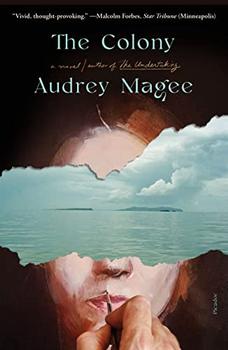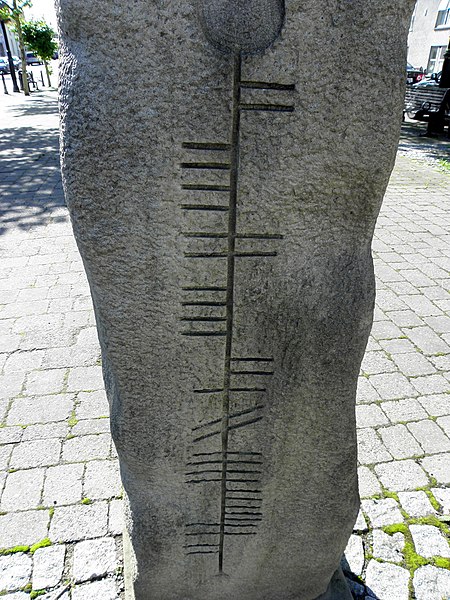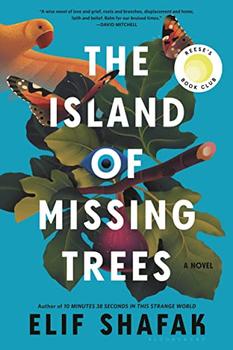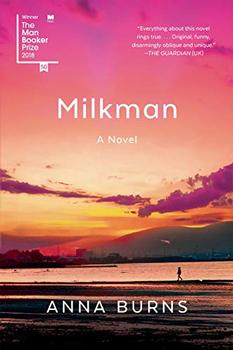Summary | Excerpt | Reviews | Beyond the book | Read-Alikes | Genres & Themes | Author Bio

A Novel
by Audrey MageeIn 1979, as violence erupts all over Ireland, two outsiders travel to a small island off the west coast in search of their own answers, despite what it may cost the islanders.
It is the summer of 1979. An English painter travels to a small island off the west coast of Ireland. Mr. Lloyd takes the last leg by curragh, though boats with engines are available and he doesn't much like the sea. But he wants the authentic experience, to be changed by this place, to let its quiet and light fill him, give him room to create.
He doesn't know that a Frenchman follows close behind. Masson has visited the island for many years, studying their language. He is fiercely protective of their isolation; it is essential to exploring his theories of language preservation and identity.
But the people who live on this rock―three miles long and half a mile wide―have their own views on what is being recorded, what is being taken, and what ought to be given in return. Over the summer, each of them― from great-grandmother Bean Uí Fhloinn, to widowed Mairéad, to fifteen-year-old James, who is determined to avoid the life of a fisherman―will wrestle with their own values and desires. Meanwhile, all over Ireland, violence is erupting. And there is blame enough to go around.
An expertly woven portrait of character and place, a stirring investigation into yearning to find one's own way, and an unflinchingly political critique of the long, seething cost of imperialism, Audrey Magee's The Colony is a novel that transports, that celebrates beauty and connection, and that reckons with the inevitable ruptures of independence.
Excerpt
The Colony
He handed the easel to the boatman, reaching down the pier wall towards the sea.
Have you got it?
I do, Mr Lloyd.
His brushes and paints were in a mahogany chest wrapped in layers of thick, white plastic. He carried the chest to the edge of the pier.
This one is heavy, he said.
It'll be grand, Mr Lloyd. Pass it down.
He knelt on the concrete and slid the chest down the wall towards the boatman, the white plastic slipping under his fingers.
I can't hold it, he said.
Let it go, Mr Lloyd.
He sat on his heels and watched the boatman tuck the chest and easel under the seat near the prow, binding each to the other with lurid blue string.
Are they secure?
They're grand, Mr Lloyd.
I hope they're secure.
As I said, they're grand.
He stood up and brushed the dust and dirt from his trousers. The boatman lifted his arm, offering his hand.
Just yourself then, Mr Lloyd, sir.
Lloyd nodded. He handed his canvas pack to the boatman and stepped cautiously onto the ladder set into the crumbling pier.
...
Interestingly, Magee chooses not to use speech punctuation; consequently, all communication — verbal or internal — becomes an organic element of the tapestry of the island: Traditional language and behaviors intermingle with incoming influences — including the two foreign visitors. What becomes clear is that both men have mythologized the community, consumed by their own agendas — perhaps the hallmark of the colonist. But the two summer inhabitants are not the only source of territorial conflict in The Colony. Stark, bulletin-style accounts of real-life atrocities on the mainland coldly explode from the page in chapters that are brief, factual, clinical. They are a forceful reminder that this is 1979, when terrorist acts carried out by both Loyalist paramilitaries and the Provisional IRA are at their peak. And at the root of this brutal bloodshed is colonization, enmeshed in the long and complicated history of England's violation of Ireland...continued
Full Review
(823 words)
This review is available to non-members for a limited time. For full access,
become a member today.
(Reviewed by Amanda Ellison).
 Mary Beth Keane, author of Ask Again, Yes
The Colony is a brilliant novel, a subtle and thoughtfully calibrated commentary about the nature and balance of power between classes, cultures, genders. There is violence here, but, most impressively, Audrey Magee captures that more insidious cruelty—the kind masked as protection, as manners.
Mary Beth Keane, author of Ask Again, Yes
The Colony is a brilliant novel, a subtle and thoughtfully calibrated commentary about the nature and balance of power between classes, cultures, genders. There is violence here, but, most impressively, Audrey Magee captures that more insidious cruelty—the kind masked as protection, as manners. Tsitsi Dangarembga, author of This Mournable Body
The Colony: so brilliant in its quiet tragedy, so revealing in its precision. It haunts me.
Tsitsi Dangarembga, author of This Mournable Body
The Colony: so brilliant in its quiet tragedy, so revealing in its precision. It haunts me. In Audrey Magee's The Colony, one of the characters dedicates his career to salvaging a language that is under threat of extinction: Irish. The source of his research is a multi-generational family, the oldest of whom speaks Irish exclusively, while the youngest is very much Anglicized. This family's linguistic patterns are representative of the continuing decline of the Irish language.
In Audrey Magee's The Colony, one of the characters dedicates his career to salvaging a language that is under threat of extinction: Irish. The source of his research is a multi-generational family, the oldest of whom speaks Irish exclusively, while the youngest is very much Anglicized. This family's linguistic patterns are representative of the continuing decline of the Irish language.
But it wasn't always this way: Irish (or Gaelic, as it is sometimes described) is part of the Celtic language family. The Irish variant developed during the Celtic migrations to Ireland from mainland Europe that took place around 500 BCE.
Written Irish can be traced back to the ogham inscriptions of the 4th century CE. Ogham is sometimes likened to...
This "beyond the book" feature is available to non-members for a limited time. Join today for full access.

If you liked The Colony, try these:

by Elif Shafak
Published 2023
A rich, magical new novel on belonging and identity, love and trauma, nature and renewal, from the Booker-shortlisted author of 10 Minutes 38 Seconds in This Strange World.

by Anna Burns
Published 2018
Winner of the 2018 Man Booker Prize, Milkman is a tale of gossip and hearsay, silence and deliberate deafness. It is the story of inaction with enormous consequences.





